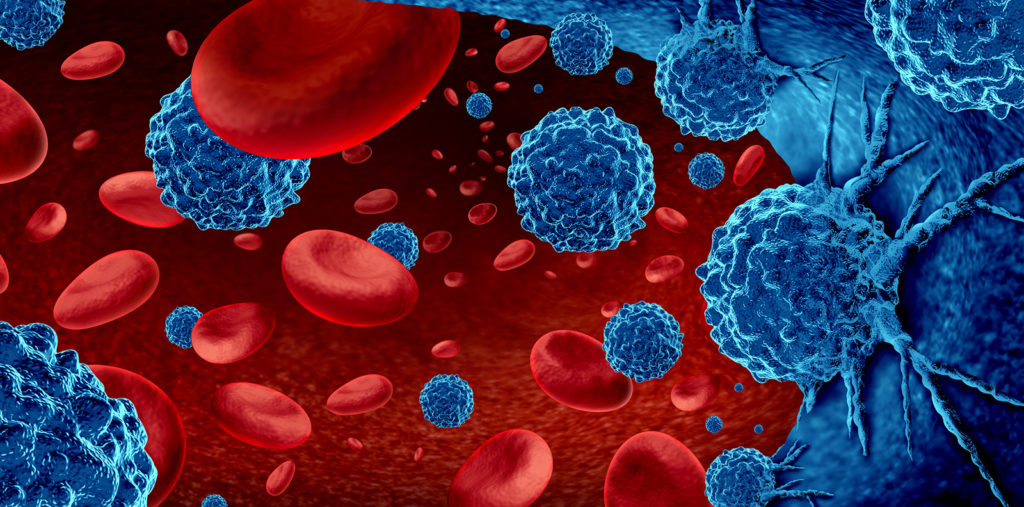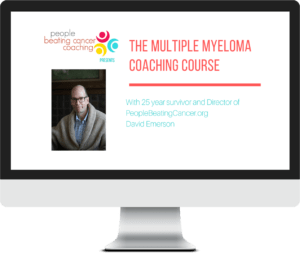
Recently Diagnosed or Relapsed? Stop Looking For a Miracle Cure, and Use Evidence-Based Therapies To Enhance Your Treatment and Prolong Your Remission
Multiple Myeloma an incurable disease, but I have spent the last 25 years in remission using a blend of conventional oncology and evidence-based nutrition, supplementation, and lifestyle therapies from peer-reviewed studies that your oncologist probably hasn't told you about.
Click the orange button to the right to learn more about what you can start doing today.

Multiple Myeloma Articles
Can you live a normal life with myeloma? Understanding the best of both conventional and non-conventional multiple myeloma therapies allows you to live “the new normal.”
A diagnosis of any cancer, especially a rare blood cancer such as multiple myeloma, is life-changing. While the prognosis for multiple myeloma is limited at best, I think my experience opens the door for more than the conventional standard-of-care for all MM patients.
I hadn’t even heard of a cancer called multiple myeloma when my oncologist gave me the bad news. I had been living with a pain in my neck for several months leading up to my multiple myeloma diagnosis.
Multiple myeloma symptoms, chemotherapy regimens, a bone marrow transplant — I knew nothing about these things. I had a lot to learn…understanding multiple myeloma means that you can live a new normal.
Currently there is no cure for multiple myeloma. In my experience, combining the best of both conventional and non-conventional therapies can improve your prognosis for multiple myeloma and quality of life.
The likely prognosis for multiple myeloma patients will be remissions and relapses over a period of years. It is possible to experience a first remission of years followed by a series of shorter relapses and remissions.
Experience has taught me that it is essential to learn as much as you can about your multiple myeloma if your goal is to live the best possible quantity of life as well as quality of life. This is your new normal life with multiple myeloma.
Every decision you make in the coming years about you and your cancer will depend on understanding your multiple myeloma. As the saying goes, knowledge is power.
This post — Prognosis for Multiple Myeloma — is the entry to the hundreds of pages of studies and experiences cataloged on PeopleBeatingCancer.
I researched and created the Multiple Myeloma Cancer Coaching Program in order to provide MM patients with an evidence-based, step by step program to learn about their Multiple Myeloma.
I am a long-term Multiple Myeloma Survivor and MM Cancer Coach. I research and write about all things multiple myeloma. PeopleBeatingCancer is dedicated to providing the experience and research needed to manage your multiple myeloma.
I work with newly diagnosed MM patients, MM patients who have relapsed, online MM groups, and I administer a private MM group called Beating Myeloma.
Multiple Myeloma Symptoms
Have you been living with bone or joint pain for a while now? Have you had a skin rash or nerve pain and not understood why? Or maybe you’ve been mis-diagnosed? Bone, joint, skin, and nerve pain are several of the more common multiple myeloma symptoms. That is to say, these are some of the health problems caused by monoclonal proteins before you are diagnosed with multiple myeloma.
Multiple Myeloma Diagnostic Criteria
Multiple myeloma is notoriously difficult to diagnose. Therefore, many tests examining your blood, urine, and even your bone marrow are used to determine if you have multiple myeloma. If you do, your stage at diagnosis is determined by your diagnostic criteria.
Multiple myeloma diagnostic criteria go by the acronym CRAB:
- Calcium — A test called a Comprehensive Metabolic Panel will measure calcium in your blood (serum).
- Renal — This same test will measure how your kidneys (renal) are working.
- Anemia — A test called Complete Blood Count will measure your red and white blood cells to see if you are living with anemia and are experiencing fatigue.
- Bone — Imaging studies such as X-rays, MRI, PET scans, or CT scans can look inside your bones to determine if you have lytic lesions (MM) growing in your bones.
In addition, you will probably also undergo a serum protein electrophoresis test (SPEP), an Immunofixation test, a Freelight Chain test, a bone marrow biopsy, a Fluorescence in situ hybridization (FISH) test, and possibly others. As I say, multiple myeloma is difficult to diagnose. Thorough diagnostic testing is your most important first step to managing your MM for the rest of your life.
Multiple Myeloma Staging
Staging your diagnosis of multiple myeloma is the second important step for managing your cancer. Multiple myeloma has only three (3) stages: I, II, and III. According to research, 95% of all newly diagnosed patients are stage 2 or 3.
- The prognosis for early stage multiple myeloma is much better/longer than it is for stage 3.
- The prognosis for the young patient is much better/longer than the elderly patient.
- The prognosis for newly diagnosed patients with comorbidities can dramatically affect their overall survival.
Multiple Myeloma Conventional Therapies
When I use the phrase “conventional therapies,” I am talking about those treatments that have been researched and approved by the Food and Drug Administration (FDA). They are surgery, chemotherapy, and radiation.
Your Board-certified Oncologist will prescribe only FDA-approved therapies to treat your multiple myeloma. Whether you are newly diagnosed or have relapsed, you will undergo surgery, chemotherapy, and/or radiation to treat your multiple myeloma.
FDA approved treatments (the standard-of-care for multiple myeloma):
- Induction Therapy — Induction therapy is designed to reduce the NDMM patient’s multiple myeloma as much as possible in preparation for an autologous stem cell transplant.
- Autologous Stem Cell Transplant — Killing your old immune system and growing a new immune system using your own stem cells.
- Maintenance Chemotherapy — Undergoing low-dose chemotherapy in order to remain in remission for as long as possible.
Multiple Myeloma Response Criteria & Response to Treatment
The reason why you are undergoing therapy for your newly diagnosed multiple myeloma is to stabilize your disease. How you respond to treatment is referred to as “response criteria” or your “response to treatment.”
- Complete Remission — Minimal Residual Disease (- or +)
- Very Good Partial Remission (VGPR)
- Partial Remission (PR)
- Stable Disease (SD)
- Progressive Disease (PR)
All newly diagnosed multiple myeloma patients want to get rid of all of their cancer as well as all of the monoclonal proteins (multiple myeloma cells) in their bone marrow. Unfortunately, no one responds 100% to treatment. Even the most complete response possible — MRD (-) — means that there are 4 monoclonal proteins for every one million normal cells.
- Your formal response criteria measures how you respond to treatment.
- How you respond to treatment can guide your future treatment decisions.
Multiple Myeloma Side Effects
Most of us know about common short-term side effects of cancer therapies. Think nausea, fatigue, hair loss. Hopefully all are temporary health problems. Though I don’t think oncology does a good job of educating the multiple myeloma patient about long-term side effects of treatment, I think treatment-related side effects must be included in the discussion about your multiple myeloma treatment plan.
- Short-term side effects include nausea, fatigue, and hair loss
- Long-term side effects include nerve, heart, brain, and joint damage
Multiple Myeloma Non-Conventional Therapies
All multiple myeloma therapies that I refer to as non-conventional therapies are those treatments that have not been researched and approved by the Food and Drug Administration. This isn’t necessarily a bad thing. The FDA doesn’t approve nutritional supplementation for example.
While there are thousands of studies touting the health benefits of exercise for the multiple myeloma patient, for example, you will never see the FDA approve exercise for treatment.
Since I achieved complete remission from my multiple myeloma in April of 1999, I have researched and written about evidence-based non-conventional therapies such as:
- Anti-angiogenic nutrition
- Anti-angiogenic nutritional supplementation
- Lifestyle therapies
- Exercise — frequent but moderate
- Whole-body hyperthermia
- Mind–body therapy
These are just some of those therapies that I define as evidence-based but non-conventional.
You can learn more about my journey here. If you’d like to get a more personalized approach to managing your cancer, I encourage you to sign up for my multiple myeloma coaching program. If you have any other questions, would like to contribute, or otherwise get involved, you can reach out to us here.
David Emerson
- MM Survivor
- MM Cancer Coach
- Director PeopleBeatingCancer
Articles That Discuss Multiple Myeloma
Why Treat Smoldering Multiple Myeloma W/Toxic Chemo Now?
“Most people with smoldering multiple myeloma eventually develop myeloma, which is why patients are closely monitored by their doctors.” Most people with smoldering multiple myeloma progress
Continue readingMultiple Myeloma-BIPN aka Nerve Damage
“The reported incidence of bortezomib-induced peripheral neuropathy (BIPN) ranges from 25 to 75 % (among MM patients). This marks the fifteenth time I’ve written about chemotherapy/bortezomib-induced
Continue reading“MRD is the Goal in Multiple Myeloma” Dr. Raphael Fonseca
“…at the time you start therapy, I think the aspiration should be for (MM) patients to get to MRD- status.”
Continue readingMyeloma Myeloma aka Incurable Cancer Treatment at the End of Life
“As the elderly man with an incurable cancer (MM) lay dying, he told his son he had only one regret. Rather than enjoying his last weeks of life with the people and places he loved, he had squandered
Continue readingTop-Rated US Cancer Center- Multiple Myeloma NOT the same as “Cancer”
“You will find you are between 1.9 and 5.7 times more likely to die in 5 years at the average SEER facility (Statistics developed by the National Cancer Institute) than if under the care of one
Continue readingCancer-Related Fatigue in Multiple Myeloma
“(Cancer-related fatigue) occurs (in MM) due to various reasons, such as patient-related factors, treatment-related factors, inflammatory cytokines, and metabolic and/or endocrine dysregulation.” Cancer-related
Continue readingMyeloma- Smoothie, Protein, Chia/Flax
Another hint for making a Tasty Fruit Smoothie is to add frozen fruit. I like my smoothie to be cold. I am a long-term multiple myeloma survivor living with a host of long-term side effects including
Continue reading“I was going to be dead in 3 years. That was 13 years ago.” Multiple Myeloma
Lesson#1- don’t be afraid to walk out and find another multiple myeloma oncologist…Lesson#2- don’t be afraid to call someone. ” My story may sound typical but I have learned
Continue readingDarzelex + VRd @ Induction Increases sCR, MRD for Multiple Myeloma-
“…Darzalex in combination with Revlimid,Velcade and dexamethasone, (VRd), demonstrated a higher percentage of stringent complete response (sCR) among transplant eligible, newly diagnosed
Continue readingC-B-D In Synergy w/ Myeloma
Herein, we also found that the C-B-D and T-H-C combination is able to reduce expression of the β5i subunit as well as to act in synergy with Carfilzomib to increase Myeloma cell death and inhibits cell
Continue readingComplete Remission After Allogeneic Stem Cell Transplant for Multiple Myeloma
My latest blood work finally shows normal free light chain levels (they have been below normal) and ratio. No M-spike. I am told that I am in complete remission (CR) from my multiple myeloma. Hi David, I
Continue readingHospitalized for Multiple Myeloma ASCT? Try Yoga-
Hospitalized patients receiving treatment for hematological cancer (MM) were provided a 40-minute individualized yoga therapy session… The key to managing multiple myeloma (MM), especially if you
Continue reading

